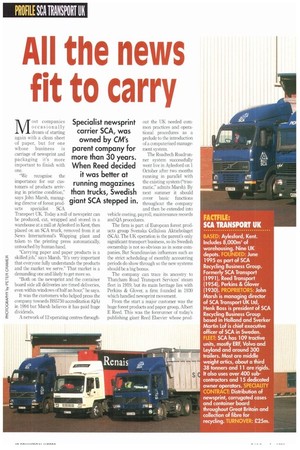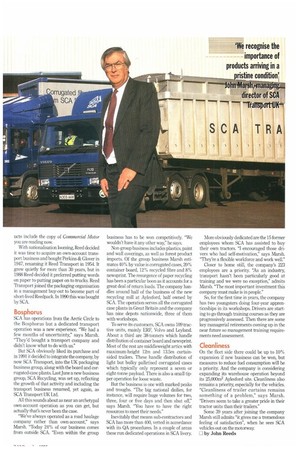All the news fit to carry
Page 44

Page 45

If you've noticed an error in this article please click here to report it so we can fix it.
Specialist newsprint carrier SCA, was owned by CM's parent company for more than 30 years. When Reed decided it was better at running magazines than trucks, Swedish giant SCA stepped in.
Most companies occasionally dream of starting again with a clean sheet of paper, but for one whose business is carriage of newsprint and packaging it's more important to finish with one.
"We recognise the importance for our customers of products arriving in pristine condition,says John Marsh, managing director of forest products specialist SCA Transport UK. Today a roll of newsprint can be produced, cut, wrapped and stored in a warehouse at a mill at Aylesford in Kent, then placed on an SCA truck, removed from it at News International's Wapping plant and taken to the printing press automatically, untouched by human hand.
"Carrying paper and paper products is a skilled job," says Marsh. "It's very important that everyone fully understands the products and the market we serve." That market is a demanding one and likely to get more so.
"Both on the newsprint and the container board side all deliveries are timed deliveries, even within windows of half an hour," he says.
It was the customers who helped press the company towards BS5750 accreditation (QA) in 1994 but Marsh believes it has paid huge dividends.
A network of 12 operating centres through
out the UK needed common practices and operational procedures as a prelude to the introduction of a computerised management system.
The Roadtech Roadrunner system successfully went live in Aylesford on 1 October after two months running in parallel with the existing system ("traumatic," admits Marsh). By next summer it should cover basic functions throughout the company and then be extended into vehicle costing, payroll, maintenance records and QA procedures.
The firm is part of European forest products group Svenska Cellulosa Aktiebolaget (SCA). The UK operation is the parent's only significant transport business, so its Swedish ownership is not so obvious as in some companies. But Scandinavian influences such as the strict scheduling of monthly accounting periods do show through so the new systems should be a big bonus.
The company can trace its ancestry to Thatcham Road Transport Services' steam fleet in 1919, but its main heritage lies with Perkins & Glover, a firm founded in 1930 which handled newsprint movement.
From the start a major customer was the huge forest products and paper group, Albert E Reed. This was the forerunner of today's publishing giant Reed Elsevier whose prod
ucts include the copy of Commercial Motor you are reading now.
With nationalisation looming, Reed decided it was time to acquire an own-account transport business and bought Perkins & Glover in 1947, renaming it Reed Transport in 1954. It grew quietly for more than 30 years, but in 1988 Reed decided it preferred putting words on paper to putting paper on to trucks. Reed Transport joined the packaging organisation in a management buy-out to become part of short-lived Reedpack. In 1990 this was bought by SCA.
Bosphorus
SCA has operations from the Arctic Circle to the Bosphorus but a dedicated transport operation was a new experience. "We had a few months of uncertainty," says Marsh. "They'd bought a transport company and didn't know what to do with us."
But SCA obviously liked its purchase and in 1991 it decided to integrate the company, by now SCA Transport, into the UK packaging business group, along with the board and corrugated-case plants. Last June a new business group, SCA Recycling, was set up, reflecting the growth of that activity and including the transport business renamed, yet again, as SCA Transport UK Ltd.
All this sounds about as near an archetypal own-account operation as you can get, but actually that's never been the case.
"We've always operated as a road haulage company rather than own-account," says Marsh. "Today 24% of our business comes from outside SCA. "Even within the group business has to be won competitively. "We wouldn't have it any other way," he says.
Non-group business includes plastics, paint and wall coverings, as well as forest product imports. Of the group business Marsh estimates 40% by value is corrugated cases, 20% container board, 12% recycled fibre and 8% newsprint. The resurgence of paper recycling has been a particular boon as it accounts for a great deal of return loads. The company handles around half of the business of the new recycling mill at Aylesford, half owned by SCA. The operation serves all the corrugated case plants in Great Britain and the company has nine depots nationwide, three of them with workshops.
To serve its customers, SCA owns 109 tractive units, mainly ERF, Volvo and LeylancL About a third are 38-tonners which handle distribution of container board and newsprint. Most of the rest are middleweight artics with maximum-height 12m and 13.5m curtainsided trailers. These handle distribution of light but bulky palletised corrugated cases which typically only represent a seven or eight-tonne payload. There is also a small tipper operation for loose waste.
But the business is one with marked peaks and troughs. "The big national dailies, for instance, will require huge volumes for two, three, four or five days and then shut off," says Marsh. "You have to have the right resources to meet their needs."
Inevitably that means sub-contractors and SCA has more than 400, vetted in accordance with its QA procedures. In a couple of areas these run dedicated operations in SCA livery. More obviously dedicated are the 15 former employees whom SCA has assisted to buy their own tractors. "I encouraged those drivers who had self-motivation," says Marsh. "They're a flexible workforce and work well."
Closer to home still, the company's 223 employees are a priority. "As an industry transport hasn't been particularly good at training and we were no exception," admits Marsh. "The most important investment this company must make is in people."
So, for the first time in years, the company has two youngsters doing four-year apprenticeships in its workshops. Drivers are starting logo through training courses as they are progressively assessed. Then there are some key managerial retirements coming up in the near future so management training requirements need assessment.
Cleanliness
On the fleet side there could be up to 10% expansion if new business can be won, but measures to reduce fuel consumption will be a priority And the company is considering expanding its warehouse operation beyond its 25,000m2 Aylasford site. Cleanliness also remains a priority especially for the vehicles. "Cleanliness of trailer curtains remains something of a problem," says Marsh. "Drivers seem to take a greater pride in their tractor units than their trailers."
Some 39 years after joining the company Marsh still admits "it gives me a tremendous feeling of satisfaction", when he sees SCA vehicles out on the motorway.
LI by John Reeds
FACTFILE: SCA TRANSPORT UK
BASED: Aylesford, Kent. Includes 8,000m2 of warehousing. Nine UK depots. FOUNDED: June 1995 as part of SCA Recycling Business Group. Formerly SCA Transport (1991), Reed Transport (1954), Perkins & Glover (1930). PROPRIETORS: John Marsh is managing director of SCA Transport UK Ltd, Henk Boss is president of SCA Recycling Business Group based in Holland and Sverker Martin [of is chief executive officer of SCA in Sweden. FLEET: SCA has 109 tractive units, mostly ERF, Volvo and Leyland and around 300 trailers. Most are middle weight artics, about a third 38 tonners and 11 are rigids. It also uses over 400 subcontractors and 15 dedicated owner operators. SPECIALITY CONTRACT: Distribution of newsprint, corrugated cases and container board throughout Great Britain and collection of fibre for recycling. TURNOVER: £25m.












































































































